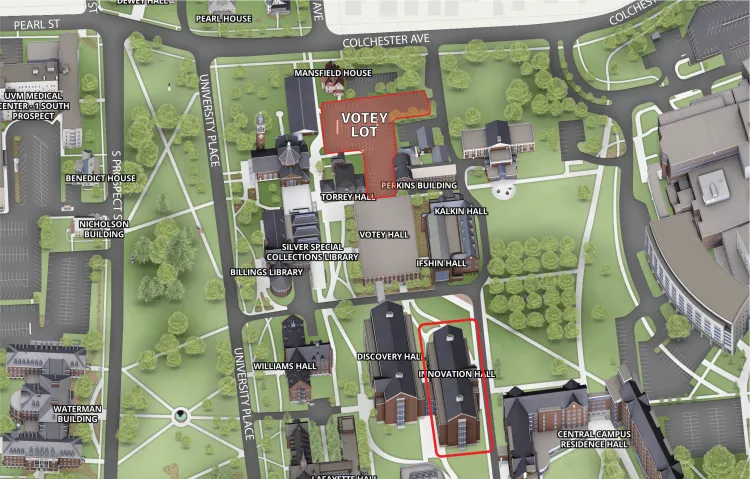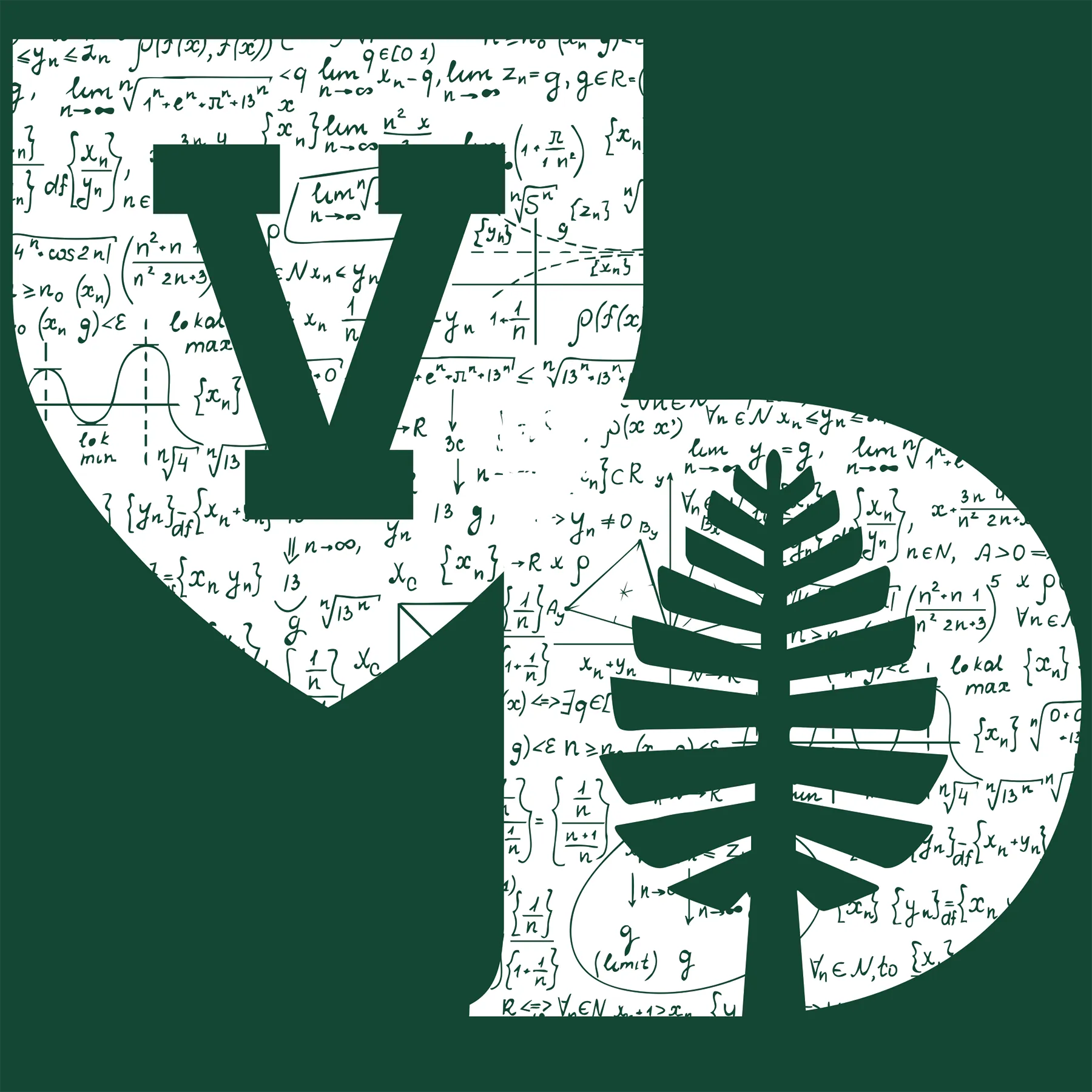This year's UVM-Dartmouth Math Day will be hosted by UVM and held in Innovation Hall
Date: April 27, 2025
Time: 9:30 am to 5:30 pm
Place: Innovation Hall, Room E105
| Time | Event/Speaker | Title |
|---|---|---|
| 9:30-10am | Coffee | |
| 10:00-11am | Puck Rombach | Plenary Talk: The combinatorics of positroids
|
| 11:00-11:20am | Haochen Wu | Hilbert modular forms from orthogonal modular forms on binary lattices |
| 11:20-11:40am | Neal Bushaw | Maximally Even Sets
|
| 11:40-12:00pm | Tobias Timofeyev | Cluster Synchronization via Graph Laplacian Eigenvectors |
| 12-2pm |
Lunch |
Downtown Restaurants
|
| 2:00-2:20pm | Brian Mintz | How norms shape the evolution of prosocial behavior: A C.U.R.E for social dilemmas |
| 2:20-2:40pm | Van Magnan
| Generalized Ramsey-Turan Numbers |
| 2:40-3:00pm | Yoonsang Lee | Nonlinear Bayesian Update
|
| 3:00-3:20 | Ahmad Reza Haj Saeedi Sadegh | On secondary invariants of spin manifolds |
| 3:20-3:50 | Break | |
| 3:50-4:50 | Alena Erchenko | Plenary Talk: Geometric flexibility and rigidity of Anosov manifolds |
| 5:00-6:00 | Dinner |
Plenary Talks:
Speaker: Puck Rombach
Title: The combinatorics of positroids
Abstract: Positroids are a class of ordered matroids that can be represented by a real matrix with all non-negative maximal minors. These structures are surprisingly rich and have been studied in contexts ranging from algebraic geometry to quantum physics. In this talk, we will discuss several interesting combinatorial connections between positroids, graphs, permutations and juggling patterns. Joint work with Jeremy Quail.
Speaker: Alena Erchenko
Title: Geometric flexibility and rigidity of Anosov manifolds
Abstract An Anosov manifold with boundary is a compact smooth Riemannian manifold M with strictly convex boundary, hyperbolic trapped set (possibly empty), and no conjugate points. We will discuss the marked boundary distance rigidity conjecture for Anosov manifolds with boundary and how to prove new cases using isometric extensions to closed Riemannian manifolds. This talk is based on joint work with Thibault Lefeuvre as well as joint work with Dong Chen and Andrey Gogolev.
Lightning Talks:
Speaker: Haochen Wu
Title: Hilbert modular forms from orthogonal modular forms on binary lattices
Abstract: We show the explicit connection between Hilbert modular forms and orthogonal modular forms arising from positive definite binary lattices over the ring of integers of a totally real number field. Our work uses the even Clifford algebra to generalize Gauss composition in a categorical way over a Dedekind domain. This allows us to classify the class sets of different types of genera in terms of the class groups of the associated quadratic algebras. This is joint work with John Voight.
Speaker: Neal Bushaw
Title: Maximally Even Sets
Abstract:``Maximally Even Sets" make appearances in a diverse slice of the modern world: as the arrangement of the black keys among the white keys on a piano; as the arrangement of magnets in spallation neutron source accelerators in nuclear physics; in the drawing of straight lines on pixelated screens; in the structure of traditional rhythms in cultures worldwide. At the heart of each of these problems is a natural problem in extremal graph theory.
We discuss recent work on the mathematical formalization of such maximally even sets based on a recent characterization for cycles and paths; we also extend these ideas to a multicolor context. Along the way we establish a connection with the majorization order on tuples of integers, originally defined by Muirhead and studied by Lorenz in his mathematical treatment of wealth inequality.
This is based joint work with Viktoriya Bardenova, Brent Cody, Paul Fay, Luke Freeman, Chris Leffler, Maya Tennant, and Toby Whitaker.
Speaker: Tobias Timofeyev
Title: Cluster Synchronization via Graph Laplacian Eigenvectors
Abstract: Almost equitable partitions (AEPs) have been linked to cluster synchronization in oscillatory systems, providing a mathematical framework for understanding collective behavior. Using the spectral properties of AEPs, we can describe this synchronization behavior in terms of the graph Laplacian eigenvectors. Our results also shed light on transient hierarchical clustering as well as multi-frequency clustering, and the conditions under which they can occur. Through our analysis we are able to relate dynamical clustering phenomena directly to network symmetry and community detection, joining the structural and functional notions of clustering in complex networks. This bridges a crucial gap between static network topology and emergent dynamic behavior. Additionally, this description of the problem allows us to define a relaxation of an AEP we call a quasi-equitable partition (QEP). Perfect AEPs are rare in real-world networks since most have some degree of irregularity or noise. While relaxing these strict conditions, QEPs are able to maintain many of the useful properties allowing for qualitatively similar clustering behavior as with AEPs. Our findings have important implications for understanding synchronization patterns in real-world networks, from neural circuits to power grids.
Speaker: Brian Mintz
Title: How norms shape the evolution of prosocial behavior: A C.U.R.E for social dilemmas
Abstract: How cooperation evolves and particularly maintains at a large scale remains an open problem for improving humanity across domains ranging from climate change to pandemic response. To shed light on how behavioral norms can resolve the social dilemma of cooperation, here we present a formal mathematical model of individuals’ decision making under general social norms, encompassing a variety of concerns and motivations an individual may have beyond simply maximizing their own payoffs. Using the canonical game of the Prisoner’s Dilemma, we compare four different norms: compassion, universalizability, reciprocity, and equity, to determine which social forces can facilitate the evolution of cooperation, if any. We analyze our model through a variety of limiting cases, including weak selection, low mutation, and large population sizes. This is complemented by computer simulations of population dynamics via a Fisher process, which confirm our theoretical results. We find that the first two norms lead to the emergence of cooperation in a wide range of games, but the latter two do not on their own. Due to its generality, our framework can be used to investigate many more norms, as well as how norms themselves emerge and evolve. Our work complements recent work on fair-minded learning dynamics and provides a useful bottom-up perspective into understanding the impact of top-down social norms on collective cooperative intelligence.
Speaker: Van Magnan
Title: Generalized Ramsey-Turan Numbers
Abstract: We study the generalized Ramsey-Tur'an function RT(n,K_q,K_p,o(n)), the maximum number of copies of K_q in an n-vertex K_p-free graph with independence number sublinear in n. The case q=2 was resolved by Erdos, Sos, Bollobas, Hajnal, and Szemeredi in the 1980s. More recently, Balogh, Liu, and Sharifzadeh resolved the q=3 and p=q+2 cases. We extend these results to the cases of q=4 and q=5, as well the general cases p\geq 5q and q+3\leq p\leq q+5, along the way disproving a conjecture of Balogh, Liu, and Sharifzadeh. Joint work with Jozsef Balogh and Cory Palmer.
Speaker: Ahmad Reza Haj Saeedi Sadegh
Title: On secondary invariants of spin manifolds
Abstract: We discuss secondary invariants and their topological formulas.
Speaker: Yoonsang Lee
Title: Nonlinear Bayesian Update
Abstract: Bayesian updating is a fundamental tool for improving the statistical accuracy of uncertain systems using measurement data, with applications spanning numerical weather prediction, robotics, and neural network training. In this talk, I will review sample-based Bayesian update methods and examine their behavior under various assumptions on the prior distribution and measurement model. Building on this analysis, I will introduce a stable Bayesian update scheme designed to handle non-Gaussian statistics. The effectiveness of the proposed approach will be demonstrated through numerical examples, including nonlinear measurements in chaotic systems, robot localization, and PDE-constrained optimization.
Registration
Titles and abstracts for contributed talks can be submitted using our online form:
2025 UVM-Dartmouth Registration Form
Parking
Parking will be available in the Votey parking lot:

Link to Interactive campus map
Questions?
For questions or additional details, please reach out to Spencer Backman at Spencer.Backman@uvm.edu
